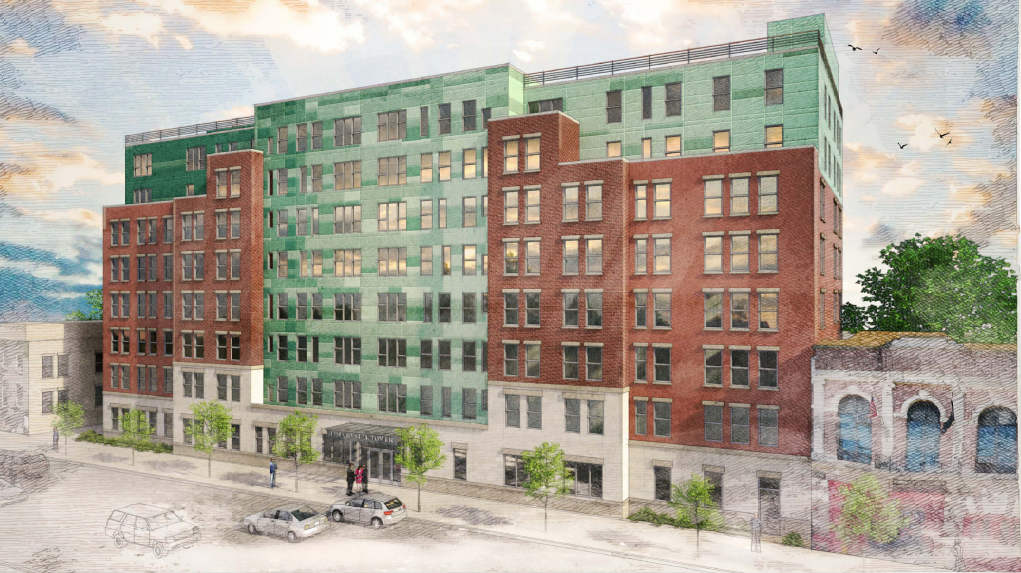New Affordable Housing Development For Flatbush (UPDATED)


[Story updated on 5/13/16 at 4pm.]
Construction is starting on a Flatbush building that will provide 123 units of permanent, affordable housing for low-income seniors, families, and persons with disabilities.
The Doe Fund, State and City agencies, and elected officials broke ground today on the Crystal Towers Supportive and Affordable Housing Project at 1345 Rogers Avenue, just off Flatbush Avenue.
The 8-story building will include 74 units reserved for low-income persons with disabilities, and 49 units — a mix of one, two and three bedroom apartments— set aside for low-income seniors and families, according to a statement from the Doe Fund.
The new development will be affordable to extremely low- and low-income households, with a majority of the apartments serving formerly homeless populations, the Doe Fund said.
Crystal Towers will provide on-site social services staff, outdoor recreation space, laundry facilities, a multi-purpose room, and parking for its tenants. The intention is to help building residents integrate into the fabric of the greater community, and absolutely not to isolate them, Doe Fund spokesman Conor Greene told us.
“Crystal Towers…brings affordable units to some of the most vulnerable people living in my district,” said local City Council Member Jumaane Williams, whose office helped to finance the project.
“This development is especially needed considering the overall need for affordable housing in our community given the rise of gentrification,” Williams said. “In my district, we often get inquiries from seniors about housing. Many of them are immigrant seniors, who are living in unsafe illegal basement apartments and rooms of relatives and friends because they are unable to afford anything else.”
Of the 123 apartments in Crystal Towers, 115 will be affordable to households earning an annual income no more than $19,050 for an individual, or $24,500 for a household of three. These apartments include 74 that will specifically serve formerly homeless households, the Doe Fund said.
Rents will be subsidized by Project-based Section 8 vouchers provided by the New York City Housing Authority — residents will only pay 30 percent of their monthly income, whatever it may be, towards rent.
The remaining seven apartments will be affordable to households earning an annual income no more than $38,100 for an individual, or $43,500 for a household of three. The income levels were set according to the U.S. Department of Housing and Urban Development’s 2016 calculations, the Doe Fund said.
Multiple Financing Streams
The construction and financing of Crystal Towers is part of Mayor de Blasio’s Housing New York: A Five-Borough, 10-Year Housing Plan to create and preserve 200,000 units of affordable housing. The total cost of the project is approximately $57 million, the Doe Fund said.
Financing comes from multiple sources. The City’s Department of Housing Preservation and Development will provide low-income housing tax credits and $7.9 million in City capital. Raymond James will act as tax credit investor. The City’s Housing Development Corporation will provide $27.8 million in tax exempt bonds towards construction financing and $6.8 million from their corporate reserves.
The project will also receive $5 million via the New York State Homeless Housing and Assistance Program and $147,600 from the New York State Energy Research and Development Authority. Borough President Eric Adams contributed $1 million. JP Morgan Chase will act as the lender.
According to Brownstoner, the Doe Fund purchased the 24,570 square foot development site on Rogers Avenue for $3.1 million in 2013. At purchase, the site consisted of a two-story detached townhouse; a single-story garage and a parking lot; and a vacant lot at 562 East 28th Street.

Demolition was completed this month and construction of Crystal Towers is expected to take about two years, the Doe Fund said.
The Doe Fund provides job training, counseling services, and housing for the homeless and recent parolees, with a special program for homeless veterans. It also has housing programs for low-income individuals and families, and those living with HIV/AIDS, substance abuse, and other chronic issues.




